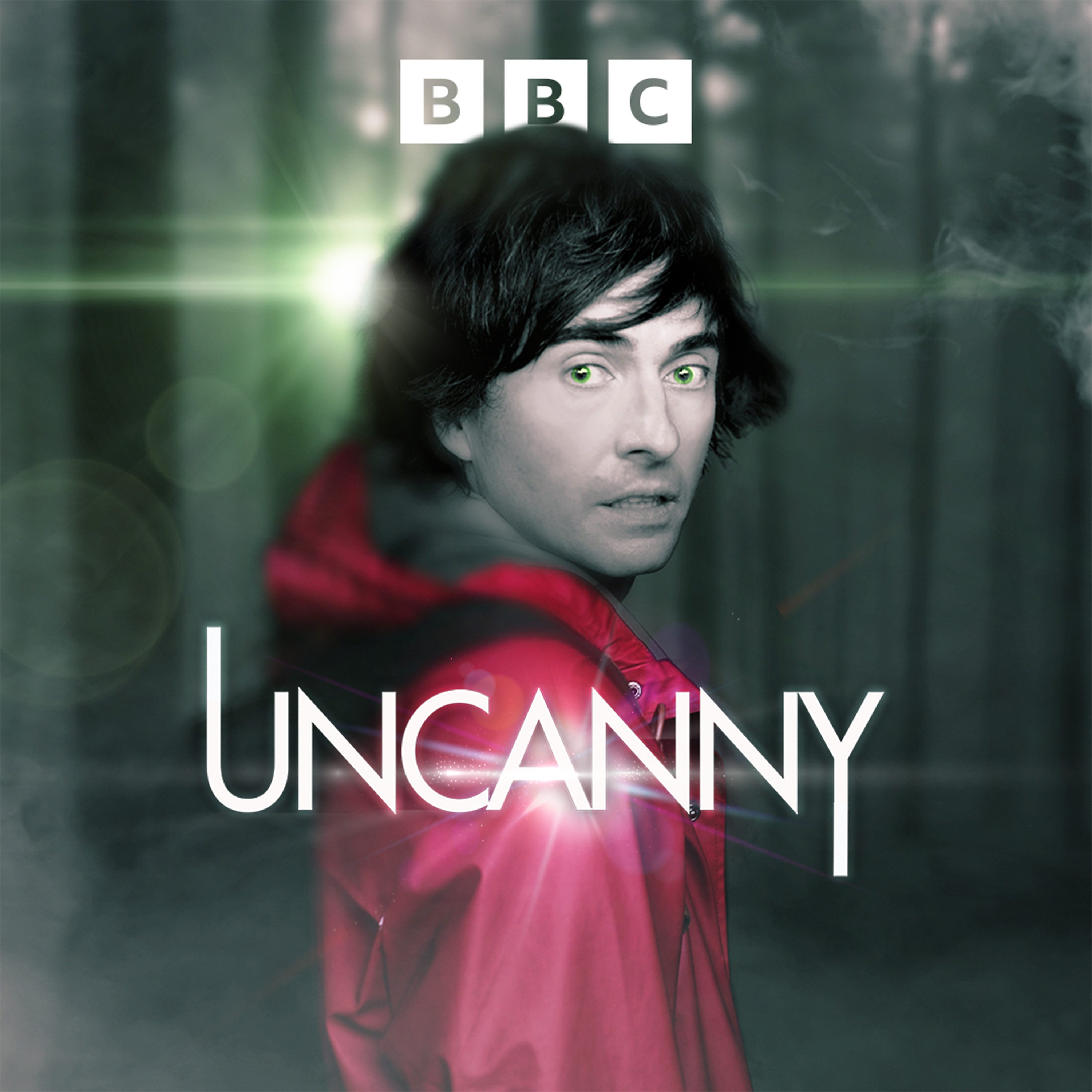
Charles Dickens: A Brain on Fire! 🔥
Guests include: Stephen Fry, Miriam Margolyes, Armando Iannucci, Alice Loxton, Robert Douglas-Fairhurst, Lucinda Hawksley, John Mullan, Pen Vogler, Andrew Davies, Rosie Holt, Bernard Cornwell .... and many more academics, writers, actors, directors and descendants of the great man himself!
Along side these interviews there are special Dickens readings from across his works ...
Thank you for listening 🔥
Charles Dickens: A Brain on Fire! 🔥
Palimpsest: with Céleste Callen
Use Left/Right to seek, Home/End to jump to start or end. Hold shift to jump forward or backward.
Celeste Callen returns to share her insights on how Henri Bergson's theories of the 'superficial self' and the 'mechanical man' permeate through Dickens' novels such as The Signal-Man, Bleak House, Hard Times, The Chimes, and Master Humphrey's Clock
Celeste Callen holds a BA (Hons) in English Language and Literature from King's College London and an MSc in Enlightenment, Romantic and Victorian Literature from the University of Edinburgh. She is a third year PhD candidate in English Literature at the University of Edinburgh. Her PhD research explores subjective temporal experience in Dickens’ fiction, through the lens of Henri Bergson’s philosophy of time. Her other areas of interest include representations of selfhood, memory, subjectivity and temporality, as well as reflections on the novel and the philosophy of time more broadly.
If you'd like to make a donation to support the costs of producing this series you can buy 'coffees' right here https://www.buymeacoffee.com/dominicgerrard
Thank you so much!
Host: Dominic Gerrard
Series Artwork: Léna Gibert
Original Music: Dominic Gerrard
Thank you for listening!
Hi everyone. I'm thrilled to welcome back to the podcast the inimitable Celeste Cannon. If you've not heard her episode on Dickens Berkson and Time Travel, I urge you to scroll back nine episodes and listen to it right now, for two reasons. This current episode will make a lot more sense if you do that and because it is simply one of the most fascinating and in-depth interviews I've ever had the pleasure to be part of on this series. You appear to still be here, so I'll press on.
Speaker 1:In the original Back to the Future movie, marty McFly travels back 30 years, from 1985 to 1955, and begins to inadvertently, at first rewrite the past in one key moment, playing lead guitar on stage at the enchantment under the sea dance.
Speaker 1:Then, in Back to the Future 2, marty travels back to the same high school dance and this time clambers high up among the theatre, flies and looks down at himself playing the guitar on the stage below. Both these interlocking journeys back in time are examples of what might be called a filmic palimpsest, where something set down in the past is then rewritten at a future date, rewriting or adding to the past. When I last spoke to Celeste, appropriately around the time of the summer solstice, I think we both felt that there were more sections to develop from our original discussion, in particular Berkson's ideas on the superficial self and the mechanical man and how not only external man-made systems can restrict us and squash our true natures, but also internal rigid systems of thought in the form of dogmas that can prevent meaningful interactions with the world around us. Focusing on the signalman, bleak house, hard times, the chimes and master Humphrey's clock. It's time to invite Celeste back into the room for our palimpsest. Celeste. Hello and welcome back to Charles Dickens' A Brain On Fire. It's so great to see you again.
Speaker 2:Hey, dominic, it's great to be back.
Speaker 1:So you're here because you've gone further into some more stories relating to Henry Berkson. So for listeners that haven't heard Celeste's amazing episode on Dickens Berkson and time travel, you need to roll back and listen to that. But yes, could you let us know then, what other discoveries have you made since we spoke during the summer solstice last year?
Speaker 2:Yeah, I was thinking about a few other examples that connect Dickens and Berkson really well and also how they differ. So the differences between them and that tension as well between them I think is really interesting. And I thought about the signalman, which is obviously a crucial connection there between that mechanical self, the social, superficial self that Berkson talks about, and obviously Dickens' own example here of that tension between maybe the movement of the self that is subjective and the spiritual and the life of the mind versus the life of matter, and maybe this mechanical rigidity that obviously we see there through the railway and the signals and the man that has become the signal himself and those ideas. So I think that tension there is really interesting between the two.
Speaker 1:Yeah, so in terms of, like you said, the mechanical man but, obviously the signalman down in the cutting has his signals with his flag and everything and the telegraphic instruments as well, on a kind of loop. But also you have the narrator being forced into doing signalling that he's totally unaware of it. It's kind of subliminal that there's this kind of supernatural technology almost out there that's controlling them.
Speaker 2:Yeah, definitely, and that sense of whether we are part of this mechanism as well as individuals and as thinking minds, and that tension there between something that's part of a system or part of maybe uncontrollable and stoppable mechanism, versus free will and our own mind and how we decide what to do as well. So I think there's always that tension in Dickens and in Berkson that really connects them in many ways.
Speaker 1:Yeah, are there points of separation then in the signalman, from where Dickens strays away from Berkson, because they're both believers in free will. Well, dickens, some of the time I always think, most of the time actually, but not so in this story.
Speaker 2:Yeah, and I think it's also that tension between the world we live in and the world that's within, yeah, and so, yeah, definitely there is a tension and something that differentiates them in the sense that, well, actually does it differentiate them? Because that's the question here with Berksson. He says that obviously, our inner life and our subjective life is really important, and is that really the core of our experience? But at the same time, we do need that external world and those mechanisms and that social world, because we are part of that world. So there is that interaction between the two and I think so in a way, it's something that seems to differentiate them. But really I think they're both saying the same thing in the end, that Dickens is also saying we are a part of the world and we are part of these social institutions and mechanisms and things that we can't really extract ourselves from and are inevitably part of ourselves as well. So maybe there's a double movement there between the two.
Speaker 1:Yes, it's sort of hearing you say that makes me think that these systems sometimes carry us along amazingly and other times they suck us under and run over us and drag us down. There was something, and I had said to myself before we logged on for this chat that I wasn't going to pile in with ideas, but I have one thought on the signal, and this was listening to the uncanny podcast that Danny Robbins wanted the idea of time slips and the idea that you could see someone in a different time. Well, you become two ghosts, so you're in your own time and you see someone from another time. For both of you, you're two ghosts seeing each other across time and you're both scared of each other. And I had this idea since hearing that but that could be something about the signalman as well that they're both frightened of each other because they're out of sync, in a different time place.
Speaker 2:And I think it's that metaphysical, you know, that metaphysical aspect of that's really how I see them connect the fact that Dickens really is interested in the haunting and the unfamiliarity of the railway and technology and mechanism in that way that doesn't feel completely in sync with our mind and the spiritual and the. So I think, yeah, it's that tension between the two, that metaphysical aspect of our existence that really connects them here.
Speaker 1:Yes, and the railway, the chronological force of railway time pushing us away from duration. I was the first person to put that in, but I didn't say jeuré, did I? There you go. Jeuré is much more elegant in the French. Yes sounds a bit lumpy, doesn't it in English? So let's moving on. Tell us, about Mrs Jellaby and Mrs Pardigle, what you're digging out from them.
Speaker 2:Yeah, in Bleak House I just always thought about that chapter, telescopic philanthropy and that whole idea of the social performance. You know, the superficial self in relation to Berksham here and that sense of when you look at the description of them. It's very similar to Scrooge or all these rigid characters that are performing or a part of this social superficial world. That's very rigid and in a sense that goes against the movement and the flow of jeuré and the subjective in that way. So here obviously Mrs Jellaby, who's so concerned with trying to be the perfect philanthropist and thinking about people far away in Africa but then who paradoxically isn't really looking after her children or her house in her own space, and Mrs Pardigle is a different type of the similar sense of that superficial performative character and she's I think she's worse, actually, isn't she?
Speaker 1:Yeah, she's worse, isn't she?
Speaker 2:Yeah, yeah, because, mrs Jellaby, we have that scene with Esther where she really falls apart and you can really see her fragility and you maybe feel more empathy for that aspect of Mrs Jellaby. But then, mrs Pardigle, you don't really get a sense of her in a life. You just see her performing this whole really violent and really rigid, mechanical.
Speaker 1:Yeah. So I mean, I think the extremist example isn't it when she goes to those poor cottages, doesn't she?
Speaker 2:Yeah, the bricklayer.
Speaker 1:The bricklayers and she sits down and they're all sort of quietly, having such a difficult existence, already a bloody particle shows up with a Bible and starts reading the Bible to them and in that moment of her doing that Bible reading, a baby dies and she doesn't engage at all with what's just happened, you know, snaps the book shut off, she goes and you think, wow, and she believes that obviously she's spreading goodness and the gospel is a bigger good, christian and setting in an example, and yet not doing anything really practical to help those people. So that's the extremist form of the delusion of the self, isn't it?
Speaker 2:Yeah, and she's described as just talking about what she's doing all the time and the narrator just explicitly says there are two different sides. I think it's. I think it's through the voice of Esther, obviously, that we hear this kind of difference between the two philanthropists and you know, the ones who just talk about what they do but don't do anything, and then the ones who do a lot but don't talk about it.
Speaker 1:Yes.
Speaker 2:So that really is that social performative superficial aspect there. It's really interesting.
Speaker 1:Yeah, that is, although there's an interesting twist in the writing which I remember, I think, from because I've read Greek house about A year ago, last yeah, and I think it's Mrs Jellaby after her daughter, caddie, is married. I think it's towards the end of the book. There's some kind of line about how she then becomes active in trying to get women in parliament and suddenly and I don't know what Dickens thinks of that, I'm sure I don't know, but it to us reading that you think well, that's actually a good cause to get.
Speaker 2:Yeah, doesn't it? Yeah, it seems like a change in her, maybe the positive way maybe, but yes, it's a fantastic chapter, isn't it telescopic philanthropy?
Speaker 1:because I want to first read Bleak house. About 10 years ago I actually remembered the title of that chapter, so yeah from that and it makes total sense, the obsession and her enlarging her sphere. So why to cover a different continent? But, as you said, her children are running around in rags. So what I've learned so far from talking halfway through this episode with you, celeste, is that this is the aspect of Berksons philosophy to do with the self, the superficial self, the social self. Is that right? What is that in French?
Speaker 2:again, yeah, I think in French he calls it the more superficial, so it's the same word. Yeah, all the social kind of requirements that we have to go towards action and other people, which is essential, and I think you know Dickens also really talks about the external being so important and that's what he's trying to Allow his readers to the reality of the real world. So it's not just that the inner world is important, but it's both and we need both. But obviously extremes are not great.
Speaker 1:So your next choice, I think, is from the chimes, which is great because Christmas is around the corner. Tell us, tell us about this one.
Speaker 2:I think, just in general, with the politicians and because of all these characters that are again very superficial and performative. And, yeah, again a lot of words and not a lot of substance.
Speaker 1:I'm gonna cut into this because obviously this is audio, so no one gets to see your expression on your face when you say that. But when you mentioned politicians, there was this weary Expression that passed across your face. I don't know who you might be thinking of, I'm not sure.
Speaker 2:Yeah, on other countries as well and another one, yeah yeah, no, I think throughout, even just beyond all the characters that are like that, very specifically criticized on day as, yeah, performative and using words in ways that are very avoid of any significance, empty words, and I think that tension again with people that you know, act and don't talk about it, rather than Talking about things a lot and not really meaning anything significant.
Speaker 1:But in our lives it would be so much better if it was easy, if they weren't so emotive. So some of these slogans that go thrown out, they really stir up emotions. People don't, they even know. Absolutely meaningless. Yeah, manipulative, and I think it was so much easier, for words that mean nothing actually meant nothing to people, but is it? Is it filer and all the men cute in the times that you're thinking of.
Speaker 2:Yeah, the good old times and the fact that there is, yeah, the sleek coated gentlemen, yeah yeah, that relates to hard times as well the facts and figures the same words that I use for Mr Grigrante, so I thought that was interesting. How, yeah, it's just always there, that aspect of the mathematical or mechanical way of seeing society and seeing people and individual lives versus the yeah, the real experience of living people and their emotional, subjective experience. So I think that's always there and so many different examples. But those facts and figures obviously Ring a bell and they really stay. When you hear those words, you just really it resonates as something that so, yeah, emotionless and rigid.
Speaker 1:The utilitarian pilot who tells trotty that he's basically starving a garrison of several hundred by just having sharing some tripe with his daughter. Yeah, the guilt he's trying to still and, of course, grad grinding hard times, like you said as well. Yeah.
Speaker 2:Yeah, completely shutting down his children's imagination or in a world. Yeah, that's really interesting and I use this character and I think at one point they are literally described as parts of a machine. I can't remember exactly how, but he literally describes Louisa and Tom. Is there Thomas as parts of a machine when he sees them in the distance? So that that description that they can give those really interesting that yeah mechanism rather than Imagination.
Speaker 1:Yeah, there's a quote from Hard Times as well, which I find incredibly powerful, and I cannot remember where it comes in and exactly what it is, but it's Dickens talking about Grad Ryan Senior. Tom, Grad Ryan Senior saying if only he'd made a mistake in his calculations some years ago, he would understand everything much better. The character had soaked up correctness, mathematical exactitude, and actually he came up with the wrong answer when it came to raising his children. And at least a total disaster for the family, doesn't it Actually?
Speaker 2:yeah, yeah, that sense that we're trying to find a specific definition or exactitude, like you're saying, is inevitably flawed, that you can't find something that's so rigid and mechanical that things are more complex and more complicated than that. I think there's that idea definitely.
Speaker 1:Winding forward then to Master Humphrey's Clock. Now I've met Master Humphrey. I suddenly remembered I didn't think I had, but of course he's the narrator at the start of the old curiosity shop. And then he shoved away yeah, he could get rid of him.
Speaker 1:But a lot of listeners actually, even though they're avid Dickensians. I bet some of the listeners haven't read Master Humphrey's Clock, so please enlighten us. I include myself amongst them as well, by the way, apart from the Christmas episode where he meets the deaf man, which is amazing. Tell us about him and what.
Speaker 2:Yeah, I was just fascinated by how there are many echoes in his in the description of Master Humphrey and his clock and his relationship to memory and time and subjectivity that really resonate with the haunted man, and really in a lot of detail. I have some passages here but again I'm not going to read the whole thing because it's quite long. But there's a fascinating passage that really echoes with the haunted man where he's talking about his memories coming back at that specific time, that quiet hour, and he talks about ghosts and actually it relates to the signal man in a sense of trying to understand how we could and why we are attracted to believing in ghosts and spirits, and he links that with memory. He says the popular faith in ghosts has a remarkable affinity with the whole current of our thoughts at such an hour as this and seems to be their necessary and natural consequence. For who can wonder that man should feel a vague belief in tales of disembodied spirits wandering through those places which they once dearly affected, when he himself scarcely less separated from his old world than they, is forever lingering upon past emotions and begun times and hovering the ghosts of his former self about the places and people that want his heart of old, and it goes on.
Speaker 2:And it's just when I was reading that I was shocked that I hadn't read it before and just thought about this in relation to the haunted man, because it's such a he's basically saying that we why wouldn't we believe in ghosts?
Speaker 2:Because they haunt the places that they used to haunt just in the same way as we haunt our memories and our the memories haunt us in the same way, and that I just thought that was fascinating. And he just goes on and on and he talks about extinguished fires, revisiting himself at this quiet hour, the house where he was born, the rooms he used to tread, and all these scenes in the same way as Scrooge or the haunted man describes. So yeah, I just thought that was really interesting. And then relating that to Berkson because he literally describes himself haunting his memories himself and Berkson talks about the fact that memories and the past is just as real and they are just as real to us as rooms that we can't see right now but are there in our memories, and so that sense of the past really being completely intertwined with the present and the memories being there with us constantly like ghosts, I just thought was really interesting.
Speaker 1:Yeah, there's that idea of the almost solid quality of a memory of the past, that it disappears from view because we're on our conveyer belt, only able to travel forward in time. So it recedes behind us, but it still exists, just because it doesn't stop existing, because we're not there and we can't see it.
Speaker 2:Just like objects. Berkson describes it as just as objects that we cannot see right now, that we cannot perceive, but they exist. Just because we can't see them doesn't mean they can't exist.
Speaker 1:So that's that same idea, which is really yeah, and of course, with the haunted man, as we said before, you know that the lack of memory, of especially sorrowful memories, leaves a blank in the universe, doesn't it?
Speaker 2:Yeah.
Speaker 1:And your own ability to empathize and be your true self.
Speaker 2:Yeah, they are all a part of who we are and our importance. But here it's strange because, master Humphrey, he's described as this lonely, solitary figure, just like you know, when we encounter Scrooge or Red Law at the beginning, and here you can see, I think he's described specifically as having this connection with his thoughts and his memories.
Speaker 2:even more because he is lonely, which obviously makes sense because he's in a way detached from the external social world. So again, there's that reinforced idea that, even though this connection to our subjective memories and thoughts is really important, we do also need a balance and that connection to the social external world. So I think that again is really emphasized here too.
Speaker 1:Yeah, that's interesting, as you're saying that because you know our social face and when we go out to a party or something and see some friends even though they're our friends you might not feel like doing that that evening, you may not want to go out, but the act of going out and putting on a little bit of a social mask then brings you back to yourself as you settle into the party. Do you sort of mean?
Speaker 2:Yeah, it's all a part of who we are. Yeah.
Speaker 1:Those systems, those societal pressures, they can go either way, can't they? I hadn't really thought of that before, because in our conversations I've always been thinking of course, yeah, the pressure of making a train on time or something. We become the mechanical man, we become away from our true selves.
Speaker 2:I think it's extremes, and Bergson really says that, and I think that Dickens would also see that you know the need for that balance between the two and that both are essential and both are really important. But yeah, it's definitely because when you see master Humphrey or Scrooge or Red Law, yeah, you think that, okay, they really need to reconnect with their inner life, and the social world is just this restriction on the self, but really it is that constant interaction between the two, I think, and that movement between the two that makes us who we are. So this idea of movement, I think this essential to, I think, indicates that really resonates yes, that reminds me again, and we're saying from berksons philosophy that it is.
Speaker 2:We're moving towards action yeah, we need to move towards an active.
Speaker 1:It's not a sort of a zoning out kind of philosophy where you lie on the floor.
Speaker 2:Yeah and don't do anything exactly, it's active active yeah yeah, and that's how I think, if dickens and berkson differ from, you know, previous philosophies of time, that we're really dominating the 19th century and before that Association is, and a pair system, that idea of a kind of passive, you know, accumulation of experiences that are just imposed on us and that we just simulate. But it's more for berkson, it's more than active. Yeah, like you say, recreation constantly of ourself through the past, recreating ourselves constantly with the past and moving on into the future and action. So I think that is really what makes Dickens and berksons idea of time different and which the connection makes really interesting wonderful.
Speaker 1:I have a parting question for you, as you're on your way home back to france for christmas. Will you be having a 12th cake? Because that's a, that's a tradition, isn't it? That that's not english one as well, but in france it carries on, doesn't? I think you still have that a lot more.
Speaker 2:Yeah, so we call we have that january in january I think okay, yeah, we have a gala dirhaw, just like the three kings, the three majors cake, yeah, where we have Piece of that in january great well, have a wonderful christmas and I'm sure our powers will cross again in the future.
Speaker 1:Yeah, all the past.
Speaker 2:Give them the name and the past. Yeah, definitely have a lovely holiday as well, and thank you so much for everything.
Podcasts we love
Check out these other fine podcasts recommended by us, not an algorithm.

A Jane Austen Year
Jane Austen's House
Dan Snow's History Hit
History Hit
The Rest Is History
Goalhanger
In Our Time
BBC Radio 4
The Rest Is Politics
Goalhanger
The Rest Is Politics: US
Goalhanger
The Rest Is Entertainment
Goalhanger
The Trawl
Jemma Forte & Marina Purkiss
Empire: World History
Goalhanger
The Rest Is Politics: Leading
Goalhanger
Page 94: The Private Eye Podcast
Page 94: The Private Eye Podcast
The Coming Storm
BBC Radio 4
Uncanny
BBC Radio 4
Here Comes The Guillotine
Global
The News Agents
Global
The News Agents - USA
Global
Daily Politics from the New Statesman
The New Statesman
The Spy Who
Audible

